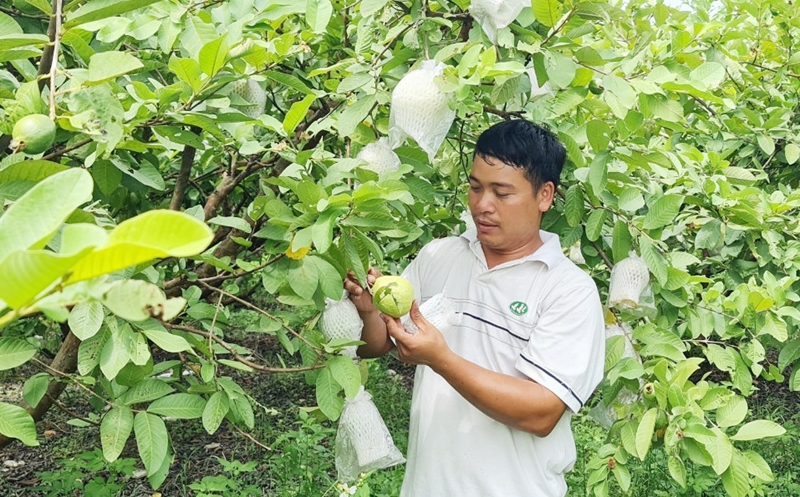 |
| The organic fruit cultivation model of Khanh Phong Agricultural Services Cooperative (Me Linh District) brings high economic value. (Photo: hanoimoi.vn) |
Along with the entire country, Hanoi is promoting and expanding organic agricultural production models, bringing delicious and clean products to the market that meet consumer demand and contribute to increasing farmers' income.
The key to modern agriculture
Linked organic agricultural production is the key to developing a modern agriculture that ensures harmonious benefits for all participants. According to Bui Thi Hanh Hieu, General Director of Bao Minh Agricultural Products Processing Joint Stock Company (Hoang Mai District), the company is currently collaborating with farmers to cultivate around 20,000 hectares of rice in 20 provinces and cities to build organic raw material areas for deep processing. Thanks to the chain linkage in organic rice production, the company's products ensure quality and are present in most supermarkets nationwide.
Soc Son District has 16 high-tech agricultural production models such as organic chicken farming, biological pig farming, and mushroom cultivation. Nguyen Van Thang, Director of Trung Gia Agricultural Services and General Business Cooperative (Soc Sơn District), stated that with nearly 2 hectares of organic vegetables, the cooperative has invested billions of VND in constructing preprocessing, packaging, and preserving facilities for organic and VietGAP vegetables. The cooperative applies the "5 Nos" standard (no chemical fertilizers, no chemical usage, no pesticides, no herbicides, no growth stimulants) and guides farmers in self-composting organic fertilizers for vegetable cultivation. Thanks to the quality of its products, the cooperative's organic vegetables are sold consistently at prices 10-15% higher than traditional vegetables.
According to Vu Thi Huong, Director of the Hanoi Agricultural Extension Center, Hanoi Department of Agriculture and Rural Development, the city currently has 2,000 hectares of organic crop cultivation and 10.1 hectares of organic aquaculture. Many organic agricultural models initially show high economic efficiency, aligning with the development trend of modern agriculture. Recently, the center has actively supported localities in building VietGAP and organic-oriented agricultural extension models as a foundation to build high-quality, standard organic agricultural models within 3-5 years. “Farmers are provided with techniques for organic crop cultivation, animal husbandry, and aquaculture to expand production, aiming to establish organic agricultural brands in the city. This contributes to shifting agricultural production from quantity to quality and value through linked chains, enhancing farmers' farming capacity and increasing the efficiency of land use,” said Vu Thi Huong.
Support for product branding
According to Trinh Thi Nguyet, Director of Dong Phu Organic Agricultural Cooperative (Chuong My District), authorities should support cooperatives regarding standards and quality to build production areas while linking with enterprises to supply input materials, control quality and ensure product consumption for farmers through a closed chain.
To expand organic agricultural models, Do Minh Tuan, Vice Chairman of Soc Son District People's Committee, stated that the district would select key agricultural products with competitive advantages for organic production, promoting the application of scientific and technical advances and modern organic production and processing processes. Additionally, the district will effectively control the risks of hygiene and food safety, creating clean and safe agricultural products for consumers, aiming for high-value, sustainable, and environmentally friendly agriculture. Soc Son District is determined to fully support high-tech and organic production units from production organization to brand promotion and product consumption.
According to Nguyen Manh Phuong, Deputy Director of Hanoi Department of Agriculture and Rural Development, the department will coordinate with localities to plan concentrated production areas for organic agricultural products in high market demand, suitable to local ecological conditions. It will enhance research, application, and transfer of high technology in agriculture, clean agriculture, and organic-oriented agriculture to create breakthroughs in productivity and quality. “The agricultural sector supports localities in building and developing brands for organic agricultural products, ensuring competitive advantages in the market; organizes fairs, applies the internet for advertising, and seeks markets for product consumption; supports cooperatives and enterprises in bringing organic products into modern distribution channels and aiming for export,” emphasized Nguyen Manh Phuong./.